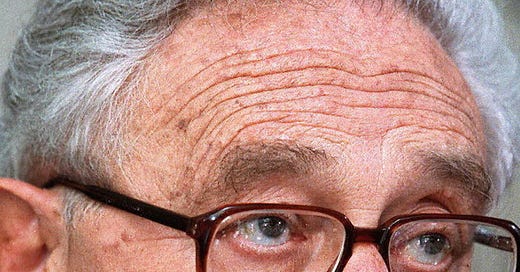Henry Kissinger’s Judgment
How to begin assessing the record of the late senior presidential adviser
I respected Henry Kissinger, who died on Wednesday at the age of 100, but I neither revered nor loathed him.
This post won’t be a proper obituary, or a denunciation, let alone a hymn of praise. What it will be is a reflection on one of my favorite topics: The essential but also mysterious role of judgment in human affairs. What makes some people look at a set of facts and come to one conclusion about them while another group of people comes to a very different conclusion? The more we reflect on that question, the more obscure the answer becomes—even as we come to realize that such conclusions form the basis of how we comport ourselves in the world. Judgment, it seems, is all we have.
This is true for all of us. But the way it works will differ considerably depending on how thoughtful and influential a person is in the world.
Ways of Judging
If you wander over to a random person on a street corner in a deep blue city and ask his or her opinion of Joe Biden, you’ll probably hear he’s doing a good job. The person might express some concerns about his age or misgivings about this or that policy he’s pursued. But the person’s judgment will probably be that Biden should be re-elected, or at least that some Democrat should be nominated and elected in his place. That would be this person’s judgment.
But where does this judgment come from? Unless you’ve happened by chance to pick a political scientist or journalist, it comes from what “they” are saying about Biden—with “they” being “everyone I know”: the person’s friends, family, co-workers, neighbors, and the news sources they encounter and trust. The judgment is basically ventriloquized conventional wisdom within a specific sociocultural milieu.
A parallel process unfolds in deep-red small towns scattered across the interior of the country. There you’ll hear about the absolute necessity (and near certainty) of defeating Biden and replacing him with a Republican, in most cases Donald Trump. And asking after reasons will quickly elicit gestures toward the things “everyone” is saying—in the neighborhood, in church, on the steps of the post office, at the bar, on Fox News, talk radio, and online.
These are people who don’t possess a lot of independent knowledge and thinking about the political world. They tend to form their judgments by relying on the judgments (or intentional manipulations) of others. But as you ascend into the realm of expertise, things become more interesting. Now history and research and theory begin to enter into the picture, mixing with what the aspiring scholar or pundit brings to the table from his or her upbringing and prior education.
And then, at the very peak, you have someone like Henry Kissinger, who rises to the pinnacle of geopolitical thinking and influence in the world. That position gave him much greater freedom than most people to form his own judgments. Though even in his case, those judgments were shaped and constrained by all kinds of extraneous influences, sometimes for the better, but oftentimes for the worse.
The Mixed Record of Kissinger’s Judgments
Keep reading with a 7-day free trial
Subscribe to Notes from the Middleground to keep reading this post and get 7 days of free access to the full post archives.





